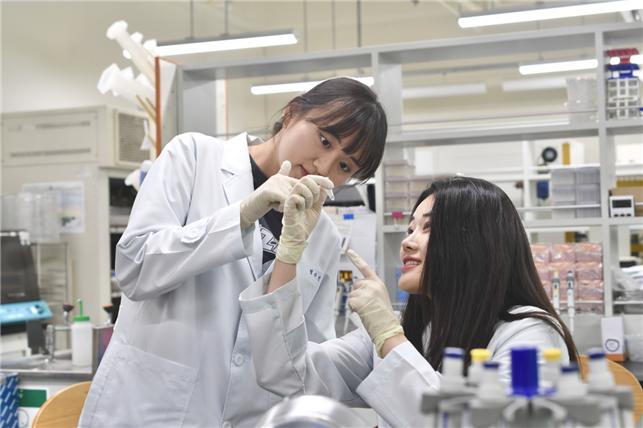 |
| ▲ Co-first authors of the thesis, Jung Su-min and Kim Ye-seul (Source: CWNU Waagle) |
CWNU Department of Biology and Chemistry promoted an ‘Independent Research Project’ as an autonomous innovation project. Among them, undergraduate students Jung Soo- min and Kim Ye- seul conducted an ‘Independent Research Project’ with the help of advisor Professor Choi Hyuk- jae at the Conservation Ecology Lab on the topic of ‘Somatic chromosome counts and karyomorphological analysis of 12 Allium (Amaryllidaceae) taxa.’ The project results were published in the Journal of Asia- Pacific Biodiversity of the SCOPUS academic journal. SCOPUS is a global academic paper database platform created in 2004 and is recognized as an indicator that can fairly evaluate universities with excellent papers written in their language. Through interviews, we learned more about the process of publishing a paper.
Q. Please introduce yourself.
Kim: Hello. I am Kim Ye- seul, a master's student who graduated from the Department of Biology and Chemistry and is currently entering graduate school majoring in Plant Genomics.
Jung: Hello. I am Jung Soo- min, a master's student who graduated from the Department of Biology and Chemistry and is currently entering graduate school majoring in Plant Genomics.
Q. Please explain the core research of this thesis.
Jung: Chromosome counts and karyotype analysis were performed on 12 taxa and 21 individuals of the Allium genus. Based on the results, polyploidization of the same species in different habitats was confirmed. In our research, the chromosomes of the Allium genus were diploid and tetraploid; mostly similar to previous studies. Among them, two species showed different results from previous studies, and new polyploidy was identified through these.
Kim: Polyploidization is a doubling of the number of chromosomes and is commonly seen in plants. Polyploidized plants have a relatively large amount of genes expressed. On account of this, the seed size and survival rate that can be obtained are higher compared to typical diploid plants. Additionally, if chromosome numbers change due to polyploidization, reproductive isolation may occur, and speciation may occur.
Q. How did you choose your research topic?
Jung: Among our Biology Department professors, there is a world- renowned professor who specializes in Allium. Thanks to them, we were able to often come across various species of Allium plants that do not exist in Korea in the Biology Department's flower bed, and when we wanted to research while looking at these, the professor recommended some of them and helped us conduct our research.
Q. Please tell us about any episodes during the process of conducting research and writing your thesis.
Kim: Our research materials are plant roots. The roots had to be collected and used, and the professor said that the best research results would be obtained if collected between 8 and 9 a.m., so it was a little difficult because I always had to come to school early in the morning to collect the roots.
Jung: The reagents we used in this experiment, such as aceto- orcein and acetic acid, have the characteristic of having an extraordinarily strong vinegar smell. For that reason, no one showed up when we were experimenting, and even the students and professors who were present, also left. Consequently, the experiment was conducted comfortably.
Q. Please tell us about your future research direction.
Kim: While studying the chromosomes of plants, we became interested in DNA and genes. In the future, We plan to study the relationship between plant morphology and genes, classify plants that are difficult to distinguish through genome analysis, and develop molecular markers (molecules, sampled from a source, that gives information about its source) that can be used in related fields such as medicinal herbs.
Professor Jang Young- hoon, dean of the Department of Biology and Chemistry, said, “Through independent research projects, we are helping undergraduate students autonomously carry out projects related to their majors.” He added, “We are doing our best to secure major laboratory space and cutting- edge equipment, so that we can hone the skills we will need in future research institutes or graduate schools.” In addition, he confirmed that he is working to plan the future of undergraduate students, saying, “We are promoting projects related to students’ advancement and employment.” We hope that not only students Kim Ye- seul and Jung Su- min, who achieved excellent results, but also all students in the Department of Biology and Chemistry, who are conducting independent research projects, will achieve meaningful results.
By Kim Na-young, reporter skdud2986@naver.com
<저작권자 © The Campus Journal, 무단 전재 및 재배포 금지>

 Shrinkflation, Consumer Deception
Shrinkflation, Consumer Deception




